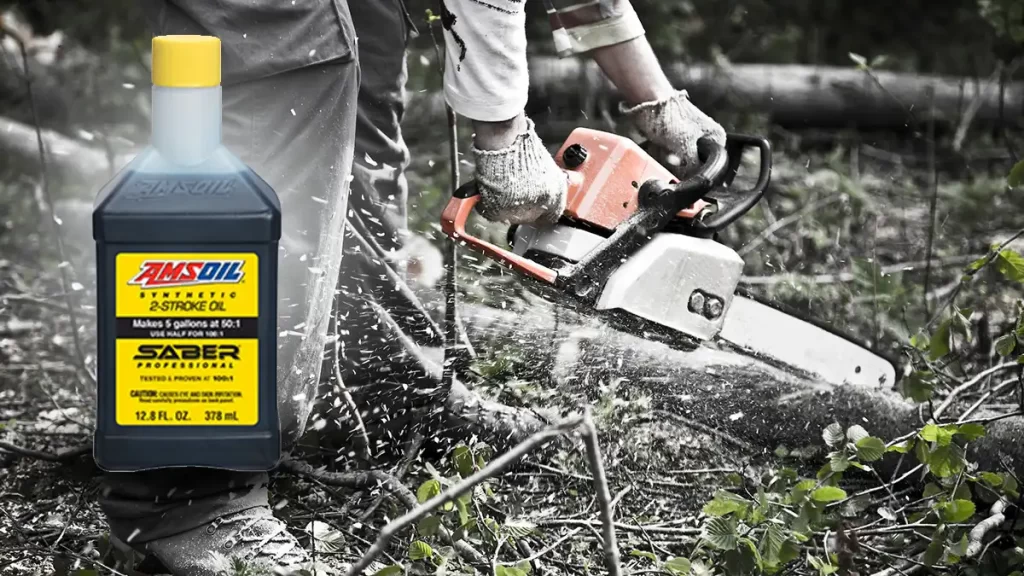It is not recommended to use 2-stroke oil as chainsaw bar oil. Chainsaw bar oil is specifically designed to provide the right consistency and adhesion to the chain.
Exploring the intricacies of chainsaw maintenance, a crucial component is selecting the appropriate lubricant for the chainsaw bar. Chainsaw bar oil is engineered to have a “tacky” quality that ensures it clings to the chain as it moves at high speeds, reducing wear on the bar and chain.
Using 2-stroke oil, typically thinner and designed for engine combustion, can lead to inadequate lubrication and increased risk of wear and tear on your chainsaw components. Understanding this distinction can save you from unnecessary repairs and ensure your chainsaw operates efficiently. Proper lubrication is key to prolonging the life of your chainsaw and ensuring optimal performance during cutting tasks.
Understanding Chainsaw Lubrication
Keeping your chainsaw in tip-top shape is crucial for safety and performance. Proper lubrication is key to this. Here, we’ll dive into how chainsaw lubrication works, and whether 2 stroke oil fits the bill as a bar oil substitute.
Chainsaw bar oil works miracles for your chainsaw’s health. It minimizes friction between the bar and chain during operation. This not only keeps the chain moving smoothly but also prevents excessive wear and dangerous overheating. Here’s what you need to remember:
- Reduces friction between the bar and chain
- Prevents the chain from snagging and wearing out quickly
- Keeps the chainsaw cool to avoid accidents
While both oils are vital for chainsaw operation, they have different purposes. 2 stroke oil is designed to mix with fuel and lubricate the engine during combustion. Bar oil, on the other hand, is tailored for the unique demands of the chainsaw bar and chain. Consider these differences:
| 2 Stroke Oil | Chainsaw Bar Oil |
|---|---|
| Mixes with fuel to lubricate the engine | Lubricates the chainsaw bar and chain |
| Has a thinner consistency | Thicker to cling to the chain in motion |
| Not designed to handle chain friction | Specifically formulated to reduce friction |
Your chainsaw’s lifespan hinges on proper lubrication. The right oil maintains performance and guards against premature wear. Here are the advantages of using dedicated bar oil:
- Maintains optimum performance
- Protects against rapid wear and tear
- Ensures safety through proper chainsaw functioning
2 Stroke Oil Versus Chainsaw Bar Oil
Using the right oil for a chainsaw is crucial for its efficiency and longevity. Many wonder if 2 stroke oil can double as bar oil. Let’s dive into the differences between 2 stroke oil and chainsaw bar oil.
Chemical Composition of 2 Stroke Oil
2 stroke oil, designed for engine lubrication, boasts specific chemicals. These chemicals protect against high heat and combustion residues. Notably, the oil contains:
- High flashpoint components
- Additives for engine cleaning
- Detergents to prevent deposit build-up
Viscosity and Properties of Chainsaw Bar Oil
Chainsaw bar oil has tailored viscosity. Its thicker nature ensures it clings to the chain during high-speed rotation. Noteworthy properties include:
- Sticky and tacky texture
- Temperature stability
- Resistance to sling-off
Performance Comparison in Chainsaw Application
In a chainsaw application, using 2 stroke oil as a bar oil substitute can lead to insufficient lubrication. Key performance elements in comparison include:
| Characteristic | 2 Stroke Oil | Chainsaw Bar Oil |
|---|---|---|
| Lubrication Quality | Lower for bar use | Higher and tailored |
| Adhesiveness | Less sticky | More sticky |
| Performance at Varying Temperatures | Less stable | More stable |
To sum up, 2 stroke oil and chainsaw bar oil serve different purposes. Optimal operation relies on using the correct lubricant for your chainsaw.
Can 2 Stroke Oil Be a Substitute?
Working with a chainsaw requires specific lubricants for peak performance and longevity. Often, the question arises, Can 2 stroke oil be a substitute for chainsaw bar oil? Let’s delve into the efficacy of using 2 stroke oil instead of the recommended chainsaw bar oil.
Short-Term Use of 2 Stroke Oil as Bar Oil
In a pinch, 2 stroke oil can temporarily take the place of chainsaw bar oil. Chainsaw users might consider this option when in urgent situations. Short-term use won’t immediately harm your chainsaw. Still, it’s essential to recognize that it’s a makeshift solution, not a permanent one.
- 2 stroke oil is thinner than bar oil.
- Lack of ‘stickiness’ leads to faster wear and increased oil usage.
- Quick fix, not a long-term solution.
Potential Risks of Using 2 Stroke Oil in Chainsaws
It’s risky to switch to 2 stroke oil for an extended period. The oil’s properties are not designed for this purpose. Substituting can lead to several issues with chainsaw operation:
| Aspect | Risk Involved |
|---|---|
| Lubrication Quality | Poorer, leading to faster chain and bar wear. |
| Viscosity | Can cause inefficient oiling and heat buildup. |
| Adherence | Lower, increasing the risk of debris interference. |
Chainsaws demand a specific viscosity to operate safely. Using alternatives like 2 stroke oil can lead to higher costs due to more frequent maintenance and the potential need for premature repairs.
Expert Opinions on Oil Substitution
Most chainsaw experts advise against using 2 stroke oil as a bar and chain lubricant. Manufacturers design chainsaw oils to preserve the lifespan of your equipment, and failing to use the correct oil can void warranties.
- Manufacturers usually recommend against substitutes.
- Warranty may be negated by improper oil use.
- Experts recommend avoiding shortcuts to save on maintenance costs in the long run.
Read the owner’s manual carefully. It guides on the right products to maintain optimal performance and safety standards.
Learn more: Chainsaw Chain Types
Implications of Using the Wrong Oil
The life and efficiency of your chainsaw depend heavily on the type of oil you use. When you select oil for your chainsaw bar, it’s critical to understand why using the correct product matters. Not all oils are equal, and choosing the wrong one could lead to significant issues. Let’s explore the implications of using the wrong oil, such as 2-stroke engine oil, in place of designated chainsaw bar oil.
Wear and Tear on Chainsaw Components
Chainsaw bar and chain longevity are at risk with the wrong oil. Using 2-stroke oil can cause rapid wear due to inadequate lubrication. Chainsaw bar oil is specifically designed to be viscous and sticky, adhering to the chain even at high speeds. This property reduces friction and prevents overheating. The key components affected include:
- Chain links – prone to faster wear
- Bar grooves – may degrade quicker
- Oiling system – could clog with inappropriate oil
Safety Concerns With Inappropriate Oils
Using the wrong type of oil, such as 2-stroke oil, in your chainsaw bar can pose serious safety hazards. Firstly, improper lubrication can cause high friction and heat, leading to potential chain snap or breakage. This could result in injury. Furthermore, 2-stroke oil has different flammability properties which might increase the risk of fire. Here are possible risks:
- Inconsistent chain rotation causing unpredictable cutting
- Increased potential for kickback due to poor lubrication
- Higher likelihood of starting fires with flammable oils
Influence on Chainsaw Warranty And Repairs
Warranties for chainsaws often specify the use of recommended lubricants. Not adhering to these recommendations can void the warranty. Consequently, repair costs from damage caused by incorrect oil usage will likely come out of your pocket. Manufacturers design their products for peak performance with certain oils. Here’s what may occur:
- Damaged parts not covered due to improper maintenance
- Cancellation of included or extended warranties
- Increase in frequency and costs of repairs
Best Practices For Chainsaw Maintenance
Maintaining your chainsaw is crucial for its performance and longevity. Knowing the right bar oil, routine checks, and alternative options can save time and money. Let’s explore the best practices for keeping your chainsaw in top condition.
Selecting the Right Bar Oil For Your Chainsaw
Choosing suitable bar oil is essential for your chainsaw’s health. Bar oil reduces friction between the chain and bar, prolonging equipment life. Use the manufacturer’s recommendation for optimal results.
Guidelines For Regular Maintenance Checks
- Inspect the chain for sharpness and tension before each use.
- Check the bar for wear and damage regularly.
- Ensure the oil reservoir is filled with appropriate bar oil.
- Clean sawdust and debris from the bar and chain after use.
Alternatives and Eco-friendly Options For Bar Oil
While 2-stroke oil isn’t ideal for chainsaw bars, there are alternatives. Biodegradable bar oils offer eco-friendly lubrication without compromising performance. They protect the environment and function well in various temperatures.

Conclusion
To sum up, using 2-stroke oil as a substitute for chainsaw bar oil is not recommended. While it might work temporarily, choosing a dedicated bar oil preserves your equipment and ensures peak performance. Always prioritize your chainsaw’s longevity and safety by selecting the appropriate lubricant. Stay sharp with Chainsaw Hive. Our Knowledge section is loaded with cutting-edge advice and facts.
